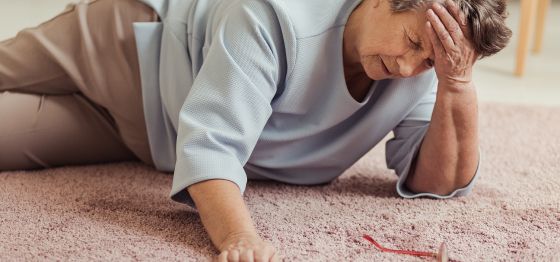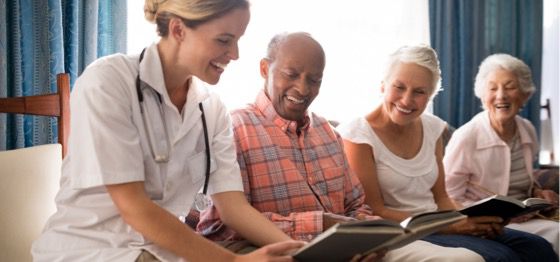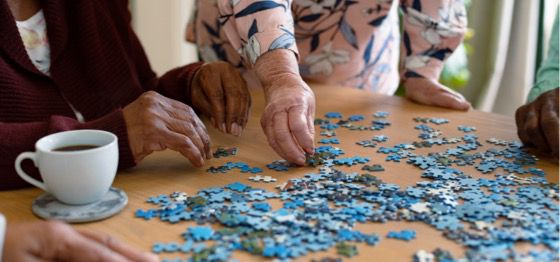Falls in older adults are a very serious subject, as illustrated by these eye-opening statistics:
- Every year, more than 1 out of 4 Americans who are aged 65+ experiences a fall.1
- Falls are the leading cause of fatal and non-fatal injuries among older adults.2
- People with mild hearing loss, some of whom are elderly, are nearly 3 times as likely to fall.3
- Each year, falls result in more than 3 million injuries treated in emergency rooms and include more than 800,000 hospitalizations.4
- Most falls (60%) happen at home, with 30% occurring in public and 10% in a healthcare facility.5
Additionally, falls—even without injury—can have a tremendous impact on older adults’ quality of life. When they fear falling, older adults may limit their activities and social interactions, which may result in further physical and mental decline and increase feelings of helplessness.
Misconceptions about falls in older adults
It’s a popular notion that falls are a normal, inevitable part of aging. Seniors may be able to prevent falls if they exercise regularly, get their vision checked, manage their medications and take steps to make their living environment safer. Here’s a look at several other misconceptions about falls in older adults.6
- By limiting their activities, seniors may avoid falls
Actually, physical activities may help boost seniors’ strength and range of motion, two things that contribute to balance and reduce the chance of falling. Social activities shouldn’t be avoided either, as they may benefit older adults’ overall well-being.
- Staying home helps minimize falls in the elderly
It doesn’t. More than half of all falls happen in the home.7 But removing hazards (clutter, slippery throw rugs, dim lighting) or making some simple modifications (a grab bar in the shower, non-slip paint on outdoor steps) may help minimize falls.
- Seniors can’t regain muscle strength and flexibility
It’s true that people lose muscle as they age, but exercise may help older adults increase strength, boost flexibility and decrease the risk of falling.
- Taking medication doesn’t increase risk of elderly falls
Certain medications may increase an older adult’s fall risk by causing dizziness or fatigue. Seniors should consult with their doctor about side effects or drug interactions that could cause a fall.
- Using a walker or cane will make seniors more dependent
Walking aids—properly fitted with the help of a physical therapist—can help older adults maintain, or even improve, their mobility, while encouraging their independence.
Tips to help prevent falls in older adults
Much of the information above can be condensed into these easy-to-remember tips to help seniors avoid falls:8
- Do strength and balances exercises
- Get hearing and vision checked regularly
- Use a cane or walker for more stability
- Stand up slowly to avoid dizziness
- Talk to doctor about medication side effects
Prevent falls room by room
Each room of the home presents different challenges and fall hazards that can affect the older adult’s safety and health. Here’s a quick primer on steps to take throughout the house to reduce fall risks:9
Stairs, halls and floors
Make sure there are secure handrails on both sides of stairways. Keep a clear view of stairs whenever going up or down. Ensure adequate lighting at top and bottom of stairs and in hallways. Keep walkways clear of books, papers, clothing and shoes. Don’t use small, slippery rugs. Avoid wet, newly washed floors.
Bathrooms
Mount grab bars on either side of the toilet and around and inside the tub or shower. Put non-skid strips or mats in areas that get wet. Always leave a light on or use a nightlight that turns on automatically when the bathroom gets dark.
Bedrooms
Position beds near light switches and use nightlights. Keep a flashlight by the bed in case the power goes off. Keep the home phone or a fully charged mobile phone by the bed.
Kitchen
Keep frequently used pots, pans and utensils within easy reach. Clean up spills right away. To prevent fatigue and possible loss of balance, prepare food while seated on a chair or counter-height stool.
Outdoor spaces
Install non-slip materials on outside steps or stairs. Keep lawn, deck or porch clear of furniture or debris. Put a grab bar near the front door. In the winter, treat steps and walks with ice-melting product or sand.
Other areas
Keep electrical cords away from walking paths. Be aware of pets’ location to avoid tripping over them. Keep frequently used items within easy reach at waist level. Don’t stand on a chair to reach things; get and use a grabbing tool.
Senior fall prevention: it’s a team effort
One of the best ways seniors can prevent a fall is by organizing a personal falls prevention team, which can include:10
- Family and friends
- Doctor and pharmacist
- Check these community resources to find out if they offer senior safety programs:
- Local fire department
- Senior center and/or library
- Faith-based organization
Each team member or community resource offers a unique perspective on the subject and may define and address fall risks, helping to keep the older adult safe and fall-free.
Go365 by Humana® makes wellness fun and easy. We help Humana Medicare members with Go365® on their plan reach health goals, as well as take care of their physical and emotional health—allowing members to thrive at any age.
Humana Medicare members with Go365 on their plan can enroll in Go365 at
Go365 is a well-being and rewards program for many Humana Medicare Advantage members. Rewards have no cash value and can only be redeemed in the Go365 Mall. Rewards must be earned and redeemed within the same plan year. Any rewards not redeemed by December 31st will be forfeited.
If you need to enroll in Medicare Advantage or change your plan outside of the usual Medicare Annual Election Period, a Special Election Period (SEP) could be the answer. For information on eligibility, visit Humana’s
To learn more about Humana Medicare Advantage, call to speak with a licensed Humana sales agent at 1-844-321-5843 (TTY:711), Monday – Friday, 8 a.m. – 8 p.m. local time or visit
Sources:
1“Older Adult Falls Reported by State,” Centers for Disease Control and Prevention, last accessed March 21, 2023,
2“Keep on Your Feet—Preventing Older Adult Falls,” Centers for Disease Control and Prevention, last accessed March 21, 2023,
3“Hearing Loss Linked to Three-Fold Risk of Falling,” Johns Hopkins Medicine, last accessed March 21, 2023,
4“Facts About Falls,” Centers for Disease Control and Prevention, last accessed March 21, 2023,
5“Addressing Falls Prevention Among Older Adults, Part I,” last accessed March 21, 2023,
6"Debunking the Myths of Older Adult Falls," National Council on Aging," last accessed March 24, 2023,
7"Six Tips to Help Prevent Falls," National Institute on Aging, last accessed March 24, 2023,
8"Preventing Falls at Home: Room by Room," National Institute on Aging, last accessed March 24, 2023,
9"Falls Prevention is a Team Effort," National Council on Aging, last accessed March 24, 2023,
This information is provided for educational purposes only. It is not to be used for medical advice, diagnosis or treatment. Consult your healthcare provider if you have questions or concerns.
Go365 is not an insurance product and is not available with all Humana health plans. This is a general description of services which are subject to change. Product features may vary by client. Please refer to Customer Support for more information.
Humana is a Medicare Advantage HMO, PPO and PFFS organization with a Medicare contract. Humana is also a Coordinated Care plan with a Medicare contract and a contract with the state Medicaid program. Enrollment in any Humana plan depends on contract renewal.




